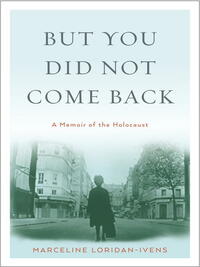You need to sign in or sign up before continuing.
Take a photo of a barcode or cover
This short, searing memoir, written as a letter from a daughter to her late father, is a powerful and moving read. It’s brevity means it can be easily read in a sitting, but it’s the kind of heart-rending, exquisitely composed story that stays with the reader long after you have reached the final page.
To read my review in full, please visit my blog.
To read my review in full, please visit my blog.
So moving and human and inhumane and personal and intimate and far-reaching. This takes the form of long letter (very short book) from Marceline to her father. They were taken to separate (but very close) concentration camps during the second world war. She makes it home; he does not. Much like the memoirs I read for research for Our Endless Numbered Days of young women kidnapped and kept in isolation for many years, making it back to her family alive does not end the tragedy.
Marceline Loran-Ivens wurde 1928 als Marcelina Rozenberg geboren und 1944 nach Ausschwitz-Birkenau deportiert. Sie lebt in Paris.
Im März 1944 wurden Marceline und ihr Vater deportiert. Die 15-jährige landet in Birkenau, ihr Vater in Ausschwitz. Im Lager haben beide kurz Kontakt. Als Marceline nach dem Krieg nach Hause zurückkehrt, ist ihr Vater nicht zurückgekommen – und wird es auch nie. In diesem 111-seitigem Büchlein schreibt Marceline ihrem Vater einen Antwortbrief auf seinen Brief, den er ihr im Lager zustecken ließ, an dessen Text sie sich aber nicht erinnern kann.
Sie schreibt über die Zeit im Lager, die Befreiung, das Ankommen zu Hause und ihr späteres Leben. Und über den großen Verlust, den zum einen der Tod ihres Vaters verursacht hat, und der zum anderen dadurch zustande kommt, das ein Teil von ihr in Birkenau blieb.
Dieser Brief ist sehr berührend und eindrucksvoll. Sie erzählt von ihrer schwierigen Ankunft zu Hause, den Konflikten mit Ihrer Mutter, die sie nicht verstand. Sie erzählt davon, das sie sich fragte, ob sie als Vollwaise nicht besser dran wäre, denn dann hätte sie die anderen Überlebenden, die sie verstanden und so waren wie sie.
Marceline ist der Überzeugung, das ihr Vater sie verstanden hätte. Mit ihm wäre ihr Leben anders und besser verlaufen. Hätte er sich für ein Leben in Israel entschieden, wäre sie mit ihm gegangen, schreibt sie. Ich denke, sie hat ihren Vater zum Helden stilisiert, was ihrem Leben sicher nicht immer gut tut. Doch sie sieht auch, das nicht nur sein Verlust prägend für sie war, sondern natürlich auch das Lager.
Man spürt sein Leben lang, dass man zurückgekommen ist.
Erst nach 70 Jahren schaffte es Marceline Loridan-Ivens diesen Brief zu schreiben. Trost spenden kann er ihr nicht, sagt sie, doch er mildert die Beklemmung. Sie hat ein eindrucksvolles Selbstbildnis geschaffen! Mich hat dieser Text sehr berührt.
Schau für weitere Buchrezensionen gern auf meinem Blog www.buchstuetze.wordpress.com vorbei!
Im März 1944 wurden Marceline und ihr Vater deportiert. Die 15-jährige landet in Birkenau, ihr Vater in Ausschwitz. Im Lager haben beide kurz Kontakt. Als Marceline nach dem Krieg nach Hause zurückkehrt, ist ihr Vater nicht zurückgekommen – und wird es auch nie. In diesem 111-seitigem Büchlein schreibt Marceline ihrem Vater einen Antwortbrief auf seinen Brief, den er ihr im Lager zustecken ließ, an dessen Text sie sich aber nicht erinnern kann.
Sie schreibt über die Zeit im Lager, die Befreiung, das Ankommen zu Hause und ihr späteres Leben. Und über den großen Verlust, den zum einen der Tod ihres Vaters verursacht hat, und der zum anderen dadurch zustande kommt, das ein Teil von ihr in Birkenau blieb.
Dieser Brief ist sehr berührend und eindrucksvoll. Sie erzählt von ihrer schwierigen Ankunft zu Hause, den Konflikten mit Ihrer Mutter, die sie nicht verstand. Sie erzählt davon, das sie sich fragte, ob sie als Vollwaise nicht besser dran wäre, denn dann hätte sie die anderen Überlebenden, die sie verstanden und so waren wie sie.
Marceline ist der Überzeugung, das ihr Vater sie verstanden hätte. Mit ihm wäre ihr Leben anders und besser verlaufen. Hätte er sich für ein Leben in Israel entschieden, wäre sie mit ihm gegangen, schreibt sie. Ich denke, sie hat ihren Vater zum Helden stilisiert, was ihrem Leben sicher nicht immer gut tut. Doch sie sieht auch, das nicht nur sein Verlust prägend für sie war, sondern natürlich auch das Lager.
Man spürt sein Leben lang, dass man zurückgekommen ist.
Erst nach 70 Jahren schaffte es Marceline Loridan-Ivens diesen Brief zu schreiben. Trost spenden kann er ihr nicht, sagt sie, doch er mildert die Beklemmung. Sie hat ein eindrucksvolles Selbstbildnis geschaffen! Mich hat dieser Text sehr berührt.
Schau für weitere Buchrezensionen gern auf meinem Blog www.buchstuetze.wordpress.com vorbei!
Un témoignage très intéressant et très bien mené.
Un témoignage nécessaire pour essayer une fois de plus de comprendre l'horreur des camps.
La postface de l'édition Poche est également très complète et prolonge la lecture.
Un témoignage nécessaire pour essayer une fois de plus de comprendre l'horreur des camps.
La postface de l'édition Poche est également très complète et prolonge la lecture.
Thanks to my Goodreads friend Chrissie for convincing me to read this book. Because it was short and I didn’t want it to languish on my to-read shelf, I borrowed it from the library. It never even got put on my currently reading shelf because even though I’m in the middle of a can’t put it down novel I decided to start it, a bit after midnight and ended up staying up half of the night reading it, until I had to sleep, so I finished up later in the morning. It was worth taking a few hours away from my novel to read it.
This book gives me hope that perhaps there are other elderly Holocaust survivors who will write other worthy memoirs.
This spare little book packs a punch, and it’s amazing how much the author is able to cover in this memoir, written as a letter to her father. She’s now an elderly woman. She was a Jew in France and at 15 she was sent to the concentration camps. She writes about her experiences in the camps, a bit about her life prior to that, and a lot about the scope of her entire life. While it’s true what other reviewers here have said that she hasn’t been able to get past the camps, nor have her surviving friends and relatives, I was actually impressed with how much she’s done in her life, how much good, despite the scars she continues to carry, despite how greatly her family was impacted, both during and after the war. She definitely makes a point of addressing the continued anti-Semitism in modern times and throughout various eras too, and the entirely of the book is what made it feel very important to me. I’m so glad that she wrote it and got it published.
I wish I could have read it in its original French but as far as I could tell it was a fine translation.
I mostly appreciate her honesty, as her way of expressing it cuts right to the heart of all that’s important, every time, in every way.
As I was reading I thought I might assign 4 stars to this book because I assumed I’d want more than what was contained within its 100 pages. By the time I got to the end though it felt complete. I can’t give it less than 5 stars. In a way it’s a slight book, but what’s there is brilliant and important. Outstanding book!
Note to self: Her father originally came from Poland and this author’s maiden name is Rozenberg, meaning mountain rose or mountain of roses. One of my grandparents was a Jew whose parents (My great grandparents) were born in Hungary, and their last name was Rosenberg, with the same meaning, just a different spelling. I always think of how the countries’ borders have changed over time. I know that this is a common name, but I’m interested in genealogy, and I always wonder who might be related to me, however distantly. I also recently found out that two of my other grandparents had ancestors from Poland, one might have been born there himself. Different surnames though.
Highly recommended for readers who like reading Holocaust memoirs, coming of age stories, historians, today’s young people high school and up.
Notable quotes:
“Surviving makes other people’s tears unbearable. You might drown in them.”
“...our family became a place where you screamed for help but no one heard, not ever.”
“...our history, the history of European Jews...they will never forgive us for the evil they've done to us”
This book gives me hope that perhaps there are other elderly Holocaust survivors who will write other worthy memoirs.
This spare little book packs a punch, and it’s amazing how much the author is able to cover in this memoir, written as a letter to her father. She’s now an elderly woman. She was a Jew in France and at 15 she was sent to the concentration camps. She writes about her experiences in the camps, a bit about her life prior to that, and a lot about the scope of her entire life. While it’s true what other reviewers here have said that she hasn’t been able to get past the camps, nor have her surviving friends and relatives, I was actually impressed with how much she’s done in her life, how much good, despite the scars she continues to carry, despite how greatly her family was impacted, both during and after the war. She definitely makes a point of addressing the continued anti-Semitism in modern times and throughout various eras too, and the entirely of the book is what made it feel very important to me. I’m so glad that she wrote it and got it published.
I wish I could have read it in its original French but as far as I could tell it was a fine translation.
I mostly appreciate her honesty, as her way of expressing it cuts right to the heart of all that’s important, every time, in every way.
As I was reading I thought I might assign 4 stars to this book because I assumed I’d want more than what was contained within its 100 pages. By the time I got to the end though it felt complete. I can’t give it less than 5 stars. In a way it’s a slight book, but what’s there is brilliant and important. Outstanding book!
Note to self: Her father originally came from Poland and this author’s maiden name is Rozenberg, meaning mountain rose or mountain of roses. One of my grandparents was a Jew whose parents (My great grandparents) were born in Hungary, and their last name was Rosenberg, with the same meaning, just a different spelling. I always think of how the countries’ borders have changed over time. I know that this is a common name, but I’m interested in genealogy, and I always wonder who might be related to me, however distantly. I also recently found out that two of my other grandparents had ancestors from Poland, one might have been born there himself. Different surnames though.
Highly recommended for readers who like reading Holocaust memoirs, coming of age stories, historians, today’s young people high school and up.
Notable quotes:
“Surviving makes other people’s tears unbearable. You might drown in them.”
“...our family became a place where you screamed for help but no one heard, not ever.”
“...our history, the history of European Jews...they will never forgive us for the evil they've done to us”
Rauwe en emotionele brief aan haar vader, die Auschwitz niet overleefde. Laat op een indrukwekkende manier zien hoe moeilijk zij het vond om daarmee en met haar verleden om te gaan.
Gibt es nicht langsam genug Erfahrungsberichte über das (Über-)Leben in den Vernichtungslagern der Nazis? Die Antwort ist nein.
“I was your darling little girl. Even at fifteen. At any age. I had so little time to save enough of you within me.”
This book is raw, deeply touching, gut-wrenching, and brutally honest. [b: But You Did Not Come Back: A Memoir|28329263|But You Did Not Come Back A Memoir|Marceline Loridan-Ivens|https://i.gr-assets.com/images/S/compressed.photo.goodreads.com/books/1451043372l/28329263._SX50_.jpg|45628601] is the story of Marceline's horrific experiences at Birkenau - a women’s concentration camp, written as a heartfelt tribute and memoir to her beloved father, who didn't come back as he died in the Holocaust. In the year of 1944, [a: Marceline Loridan-Ivens|3106167|Marceline Loridan-Ivens|https://images.gr-assets.com/authors/1450207492p2/3106167.jpg], 15 years old girl, was arrested during WW-II and separated from her father at the internment camp of Drancy, France. There she witnessed and suffered unspeakable horrors every single day for years. These ruthless memories haunted her throughout her adult life. "You have to forget" her mother tells her, "She didn’t understand where I was coming back from, or didn’t want to.”
In later life, Marceline became a writer, activist, and documentary filmmaker, but the traumas of the concentration camps shattered her life and it was never totally rebuilt.
I can’t words how deeply moving this book was. One of the best holocaust books I have ever read.
This book is raw, deeply touching, gut-wrenching, and brutally honest. [b: But You Did Not Come Back: A Memoir|28329263|But You Did Not Come Back A Memoir|Marceline Loridan-Ivens|https://i.gr-assets.com/images/S/compressed.photo.goodreads.com/books/1451043372l/28329263._SX50_.jpg|45628601] is the story of Marceline's horrific experiences at Birkenau - a women’s concentration camp, written as a heartfelt tribute and memoir to her beloved father, who didn't come back as he died in the Holocaust. In the year of 1944, [a: Marceline Loridan-Ivens|3106167|Marceline Loridan-Ivens|https://images.gr-assets.com/authors/1450207492p2/3106167.jpg], 15 years old girl, was arrested during WW-II and separated from her father at the internment camp of Drancy, France. There she witnessed and suffered unspeakable horrors every single day for years. These ruthless memories haunted her throughout her adult life. "You have to forget" her mother tells her, "She didn’t understand where I was coming back from, or didn’t want to.”
In later life, Marceline became a writer, activist, and documentary filmmaker, but the traumas of the concentration camps shattered her life and it was never totally rebuilt.
I can’t words how deeply moving this book was. One of the best holocaust books I have ever read.
Brief, heartbreaking memoir of a young woman sent to a concentration camp and the aftermath.






